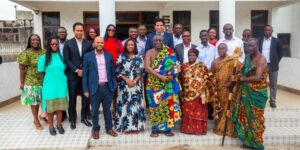While the economic fallout of the COVID-19 pandemic and the war in Ukraine has dominated Africa’s recent media coverage, political leaders from across Africa showcased another side of the continent at this year’s BRICS Summit in Johannesburg.
Ahead of the Summit, South African President Cyril Ramaphosa notably linked Africa’s enhanced BRICS engagement with “greater opportunities” for participation in the African Continent Free Trade Area, which will play a vital role in developing local African value chains in strategic, lucrative markets such as green energy and digital connectivity.
To this end, digital innovation will be critical in boosting Africa’s international trade integration and unlocking the continent’s socioeconomic promise – a reality its homegrown tech disruptors are already demonstrating.
Recent setbacks must be reversed
In Africa’s current socioeconomic climate, digitally-driven development initiatives are a matter of urgency. The World Bank has notably cited Africa’s woefully insufficient mobile Internet access as a major hindrance to job creation and poverty reduction. The problem is not merely a matter of infrastructure but of human capital as well. Tellingly, an average of 84% and 63% of local populations in sub-Saharan Africa are covered by “some level” of 3G and 4G services, respectively, yet only 22% used mobile Internet services by late 2021.
Africa boasts the world’s youngest and fastest-growing population in the world, which will see the continent assume the largest share of the global workforce by 2100, according to the World Bank. This demographic potential is greatly enhanced by the thriving tech hubs emerging in urban centres such as Nairobi, Accra and Lagos, where disruptive companies and entrepreneurs are joining forces to deliver affordable digital access, skills and technologies tailored to local needs.
Promising homegrown solutions emerging
Driven by the conviction that digital technology is now a fundamental right, Telecel Group – Africa’s first and oldest mobile telecoms operator – has been ramping up its operations across the continent to facilitate widespread mobile broadband access, including in the poorly-connected West Africa region, particularly Senegal, Liberia and the DRC.
Telecel’s recent coups include a majority stake acquisition of Vodafone Ghana in February, where the company plans to deploy 2,000 additional towers. Crucially, Telecel is harnessing the latest telecom innovations to digitise Ghana’s most remote areas and promote socioeconomic inclusion. In April, Vodafone Ghana sealed a collaboration with the satellite-to-mobile operator Lynk that will deliver reliable coverage to all of its customers, building on Telecel and Lynk’s pioneering satellite project in the Central African Republic (CAR).
Furthermore, Telecel has committed to a $700 million investment in Africa to help individuals and businesses unlock their digital potential. In this effort, its Africa Start-up Initiative Program (ASIP) will be key, with its training, resources and funding for innovative local companies fueling the development of homegrown digital solutions to the continent’s challenges. With sustainability a top priority, ASIP’s latest cohort includes innovative startups in the Climate-tech, AgriTech and GreenTech sectors, such as BD Waste in Ghana, Safetrack in Morocco and Limawa in Côte d’Ivoire.
Beyond investment, Telecel has demonstrated market leadership through its ESG strategy, which has led the company to run its data centres and cell sites on green energy to reduce its carbon footprint. What’s more, Telecel has committed to deploying energy-efficient micro datacentres in the CAR and Liberia to help meet the continent’s soaring digital demand sustainably.
This mobile Internet expansion is notably supporting Africa’s unfolding mobile banking boom. Indeed, many citizens are leapfrogging to digital banks, sparking a “neobanking fintech revolution” initially led by Safaricom’s M-PESA service in east Africa that digital banking disruptor Xhuma has just introduced in South Africa.
This local fintech player provides its customers with a combination of affordability and simplicity for their digital banking needs, from instant automated transfers to group payments and savings management. Through financially empowering the communities it serves, Xhuma aims to inspire a new digital era in its home country shaped around the needs of its digitally-minded younger generations, particularly in terms of bolstering financial literacy skills to support socio-economic growth.
Meanwhile, private innovation organisations like the Lagos-based Co-Creation Hub – Africa’s largest centre of innovation – demonstrate the importance of public-private partnerships in transforming communities through socially-oriented technology. Its new $15 million Edtech Fellowship accelerator programme will help over 70 start-ups in this emerging field develop digital solutions to Nigeria and Kenya’s pressing education problems.
Governments laying the foundation
Weak governance and rule of law issues present a significant hindrance to economic growth, African governments must create the right regulatory environment to stimulate private sector entrepreneurship and innovation.
Indeed, the continent’s leading tech innovation hubs have all been boosted by supportive public policies. In Cape Town, the South African government’s technology fund and tax incentives have spurred a significant growth of fintech and e-commerce start-ups, while Nairobi’s thriving “Silicon Savannah” ecosystem has benefitted greatly from the Kenyan government’s International Financial Center, which supports investors and helps local fintech start-ups identify funding opportunities.
Moving forward, the benefits of strong regulations could be significantly enhanced by deeper regional cooperation, with the Africa Continental Free Trade Area (AfCFTA) offering vast potential. According to the World Bank, the removal of trade barriers and regulatory harmonisation in e-commerce, competition and investment could reduce extreme poverty by 50 million people while boosting foreign direct investment by well over 100%.
Encouragingly, accelerating the AfCFTA featured prominently on the BRICS Summit agenda. Government leaders from Africa and across the Global South recognise its potential to fuel mutually beneficial development, particularly by laying the foundation for high-value regional supply chains that feed into global trade networks. Through this international partnership, Africa can thus help fuel innovation and long-term sustainable growth domestically and throughout the developing world.





